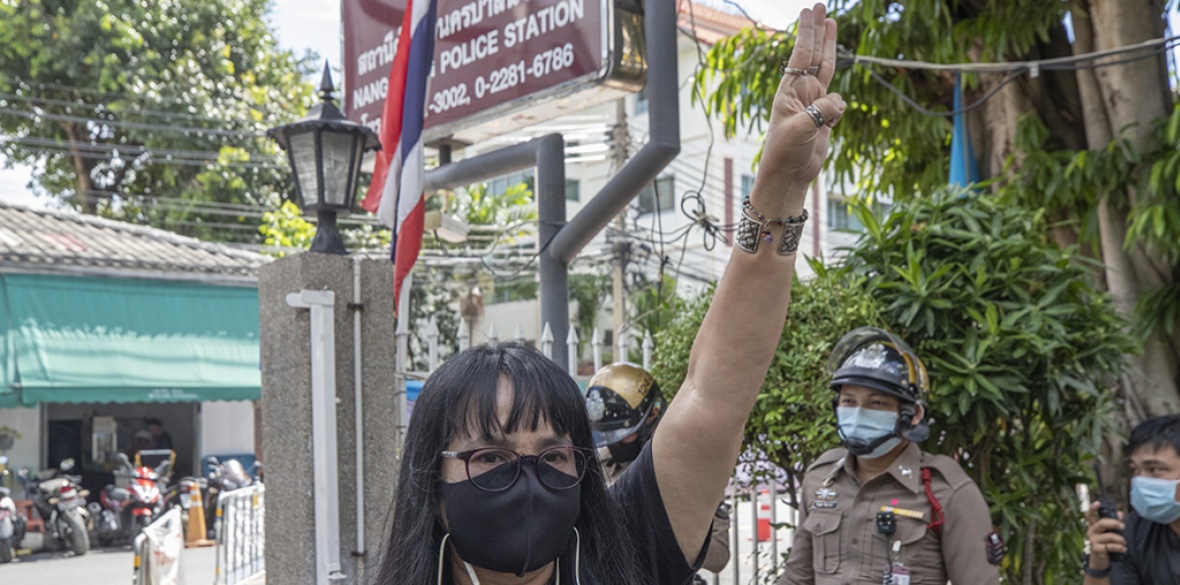FACEBOOK says it has no choice but to bar Thai citizens from accessing the so-called Royal Marketplace page, on which the powers of the country’s monarchy have been discussed.
Access has been blocked following threats from the Thai government.
The wave of protests against Thai Prime Minister Prayuth Chanocha – who seized power in a military coup in 2014 – have included open debate about the wealth, lack of accountability and abuses of power exercised by King Maha Vajiralongkorn.
Thailand’s king, who was only crowned last year following three years of mourning for his father, is certainly failing to live up to popular expectations.
Spending lockdown in a luxury hotel in Germany during a global pandemic has not gone down well, with a tweet asking “why do we need a king?” going viral when his whereabouts were revealed in April.
His reputation as a playboy was reinforced by the revival last year of a senior concubine role, and the dismissal and arrest of “royal noble consort” Sineenat Wongvajirapakdi a few months later, supposedly for plotting against the queen, appeared to confirm a vindictive streak shown when the parents of his third wife, Srirasmi Suwadee, were jailed on charges including insulting the royal family after he divorced her in 2014.
All this means that Vajiralongkorn has been quick to attract criticism that his father Bhumibol Adulyadej largely managed to avoid over a 70-year reign.
But the questions raised by Thai protesters relate to the dangerous threat to democracy the monarchy poses — with rallies calling for an end to political interventions by the king “including by endorsing military coups” — such as the one that brought the current prime minister to power in 2014.
That military putsch, which overthrew the government of Yingluck Shinawatra, was given royal assent by Vajiralongkorn’s father, as was the one that overthrew Yingluck’s brother Thaksin in 2006.
With the Thai government arresting demonstrators and shutting down social-media sites, it is unclear how the current wave of protest will end — but the weakening of an institution that has operated in close concert with the military to snuff out multiple elected governments would be cause for celebration.
The anachronism of royal power is also being questioned closer to home.
The scandals surrounding Spain’s royal family have not abated since they forced the abdication of fascist dictator Francisco Franco’s chosen successor, Juan Carlos, in 2014.
Like Vajiralongkorn, Juan Carlos made the mistake of being seen to disport himself disreputably abroad during a national crisis — in his case by shooting elephants in Botswana at the height of the economic crisis caused by the bankers’ crash. But since he stepped down, accusations of money-laundering and bribery have prompted his flight from Spain itself.
The Spanish left have pointed to the opportunity this presents to challenge the entire system of monarchy, in this case one that claims credit for the transition to democracy following Franco’s death when, in fact, its role was to manage that process to prevent a real democratic revolution and the rebirth of the Spanish republic that Franco’s legions had crushed.
The Communist Party of Spain notes that royal authority over unelected branches of the state such as the army render them unaccountable.
The same is true in Britain.
The potential of anti-democratic elements of the British state to interfere against an elected government seems less of a risk today than it did when serving generals briefed the Times that a Jeremy Corbyn-led government could face military “mutiny,” or when soldiers were caught using his image for target practice.
Nonetheless, it exists, and the undemocratic nature of the British state is one of the obstacles any socialist movement will face.
Britain’s republicans should look to events in Thailand and Spain with an eye to the greater scope for democratic reform likely to open up whenever our current and generally popular Queen passes the crown to her rather less popular offspring.











